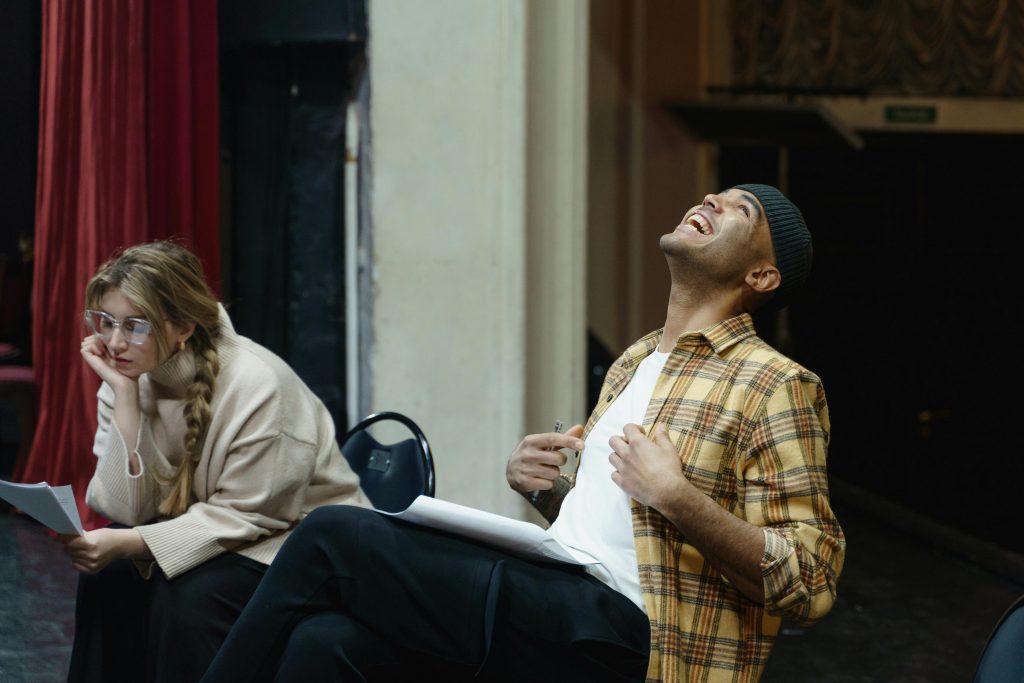Imagine standing on a stage, spotlight blazing, your heart pounding. The audience leans in, eager to hear your story. But the words catch in your throat. Sound familiar? We all have a unique tale to tell, but finding the courage to share it can feel like climbing a mountain. Our personal experiences often stay buried, leaving us feeling disconnected and unheard. It’s a common struggle – how do we turn our inner world into art that speaks to others?Enter the powerful duo of poetry and theatre. These art forms offer a canvas for your voice, but let’s be real – they can also be intimidating. What if your poem falls flat? What if your performance doesn’t connect?Here’s the exciting truth: your story matters, and it deserves to be told. Personal narratives in poetry and theatre aren’t just about creating art – they’re about discovering yourself and touching others’ lives.Ready for some good news? You don’t need to be Shakespeare or Lin-Manuel Miranda to get started. This post will show you how to tap into your experiences, overcome self-doubt, and craft authentic narratives that resonate. Let’s embark on a journey to find your voice and share it with the world!
Defining Personal Narratives in Art
In the realm of poetry and theatre, personal narratives become a powerful alchemy. They transform the ordinary into the extraordinary, turning a childhood memory into a verse that echoes in hearts, or a moment of heartbreak into a monologue that brings tears to eyes. It’s like holding up a mirror to your innermost self and inviting the world to look.Creating these narratives is an act of courage. It’s diving into the depths of your experiences, fishing for those pearls of truth that often lie hidden. Sometimes, it’s revisiting joy – the laughter of a friend, the thrill of first love. Other times, it’s confronting pain – loss, fear, or regret. Each word you write, each scene you craft, is a step towards understanding yourself and the world around you.But here’s the real magic: when you share these deeply personal stories, they cease to be just yours. They ripple out, touching others in ways you might never have imagined. Your vulnerability becomes strength, your unique voice a universal language. Through your art, strangers find comfort, inspiration, and the courage to face their own truths.In essence, personal narratives in art aren’t just self-expression – they’re bridges between souls, reminders of our shared humanity. They whisper, “You’re not alone,” and shout, “Your story matters!” It’s a beautiful, powerful thing – turning the pages of your life into art that lives and breathes in the hearts of others.

Theatre: Bringing Personal Stories to Life
Theatre transforms personal narratives into living, breathing experiences that captivate audiences. On stage, the raw emotions of human stories unfold before our eyes, bridging the gap between performer and spectator. Each gesture, each whispered line, carries the weight of genuine experience. As we watch, we’re drawn into a world where vulnerability becomes strength, and individual struggles echo our own. The magic of live performance lies in its immediacy – a shared heartbeat between actor and audience. Theatre doesn’t just tell stories; it invites us to inhabit them. We laugh with the characters, our hearts race with their triumphs, and we feel the sting of their losses. This art form challenges us to see beyond our own perspectives, offering glimpses into lives we might never otherwise encounter. In the hushed darkness of a theatre, strangers become a community, united by the power of a well-told tale. As the curtain falls, we carry these stories with us, forever changed by the experience of seeing life’s complexities played out in the spotlight.
Poetry as a Mirror of the Soul
Poetry is the art of distilling the human experience into its purest essence. Like a prism refracting light, it reveals the hidden colours of our innermost thoughts and feelings. In the hands of a skilled poet, words become more than mere symbols on a page – they transform into portals to the soul. Each carefully crafted line serves as a brushstroke, painting vivid landscapes of emotion that resonate across time and culture. Poetry challenges us to look deeper, to peel back the layers of our everyday existence and confront the raw truth underneath. It’s a dance between the tangible and the intangible, where concrete images give form to abstract concepts. When we immerse ourselves in a poem, we often discover reflections of our own joys, sorrows, and longings. The rhythm of the verses echoes the cadence of our hearts, while metaphors illuminate the shadowy corners of our psyche. Through poetry, we embark on a journey of self-discovery, finding solace in the shared human experience and inspiration in the infinite possibilities of language.

Techniques for Crafting Authentic Personal Narratives
Writing personal stories requires a mix of honesty and creative tools. The key is to start with real-life moments that moved you or changed you in some way. Using sensory details helps bring these moments to life – like describing the smell of rain before bad news or the sound of laughter during happy times. When sharing your story, focus on one main event or feeling rather than trying to tell everything at once. Break down big moments into smaller scenes that flow naturally from one to the next. Remember to include your thoughts and feelings throughout the story, as these personal touches help readers connect with your experience. Think of your story like a conversation with a friend – keep it real, stay honest, and share the details that matter most.
Overcoming Fear and Vulnerability in Storytelling
Sharing personal stories takes courage, but the rewards are worth the risk. Many writers feel scared to open up about their deepest thoughts and experiences. This fear is normal – it shows you care about your story and its impact. Start small by sharing your work with trusted friends who can offer kind feedback. Focus on the parts of your story that feel most true to you, even if they’re uncomfortable to share. Remember that your unique voice and perspective matter. When you’re honest about your struggles and victories, readers feel less alone in their own experiences. The more you practice sharing your story, the easier it becomes to embrace your authentic voice.

The Impact of Sharing Personal Stories on Audiences
Personal stories hold incredible power to move and change people. When we share our experiences through writing, we create bridges between hearts and minds. Readers often see themselves in our stories, finding comfort in knowing others have faced similar challenges. These connections can spark important conversations and help people feel understood. Good storytelling goes beyond just entertaining – it helps readers process their own emotions and experiences. By sharing our honest, personal stories, we give others permission to explore and share their own. This ripple effect can build stronger communities and deeper understanding between people from all walks of life.

The Healing Power of Self-Expression
Writing and performing can be powerful medicine for the soul. When we put our feelings into words or bring them to life on stage, something magical happens. The weight of difficult emotions becomes lighter as we shape them into stories, poems, or scenes. This creative process helps us understand our struggles better and find new ways to cope with life’s challenges. Many people find that writing about tough experiences helps them feel less stressed and more in control. Even simple acts like keeping a journal or joining a theatre group can boost our mood and help us feel more connected to others who share similar stories.
Embracing Your Unique Voice
Finding your authentic voice starts with trusting your own experiences and feelings. Every person has a unique way of seeing the world – this is what makes storytelling so powerful. Your background, culture, and personal journey shape how you express yourself through writing and performance. Don’t worry about sounding like famous writers or copying others’ styles. Instead, focus on sharing your truth in ways that feel natural to you. Start by writing about what you know best: your own life experiences, thoughts, and dreams. The more you practice sharing your story, the stronger and clearer your voice becomes. Remember that your perspective matters and adds something special to the world of creative expression.

Final Thoughts: Your Story Awaits
The journey of finding your voice starts with a single step. Pick up that pen, step onto that stage, or simply start telling your story in whatever way feels right. Your experiences are unique – they’re like fingerprints that only you possess. Think of these creative tools as keys that can unlock doors to self-discovery and connection with others.
Remember, there’s no “perfect” way to tell your story. Whether through poetry’s gentle whispers or theatre’s bold declarations, your truth will find its way to those who need to hear it. Take small steps, celebrate your progress, and be patient with yourself as you grow.
Need more guidance or have questions about getting started? Reach out at [contact information]. Your story matters, and I’m here to help you share it with the world.
Frequently Asked Questions (FAQs)
- How do I know if my personal story is worth sharing? Every story has value. If it matters to you, it will likely resonate with others who’ve had similar experiences.
- What if I’m too nervous to perform or share my work? Start small by sharing with trusted friends or joining supportive writing groups. Build confidence gradually.
- How can I protect my privacy while sharing personal stories? Choose which details to share, change names if needed, and focus on the emotional truth rather than exact details.
- Do I need formal training in poetry or theatre to tell my story? No – while training can help, authentic storytelling comes from your experiences and willingness to share honestly.
- What if I get emotional while sharing my story? It’s natural and often helps create genuine connections with your audience. Take breaks when needed.
- How do I handle criticism of my personal work? Focus on feedback that helps improve your craft while staying true to your voice. Not everyone will connect with your story.
- Can I combine poetry and theatre in my storytelling? Absolutely! Mixed forms often create powerful, unique ways to express personal narratives.
- How do I find supportive communities for sharing my work? Look for local writing groups, theatre workshops, open mic nights, or online creative communities.
- What if I can’t remember all the details of my story? Focus on the emotional truth and the impact of the experience rather than perfect recall.
- How often should I practice or write? Create a schedule that works for you – consistency matters more than quantity. Even 15 minutes daily can make a difference.

